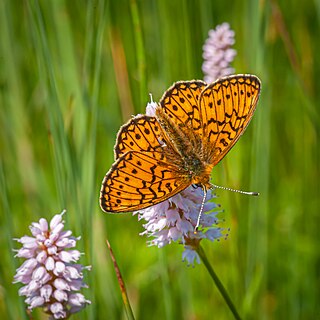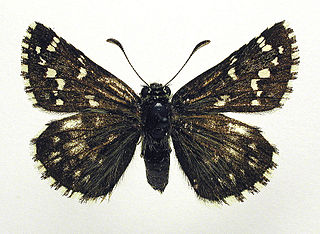
Melanargia galathea, the marbled white, is a medium-sized butterfly in the family Nymphalidae. Despite its common name and appearance, this butterfly is one of the "browns", of the subfamily Satyrinae.

Aporia crataegi, the black-veined white, is a large butterfly of the family Pieridae. A. crataegi is widespread and common. Its range extends from northwest Africa in the west to Transcaucasia and across the Palearctic to Siberia and Japan in the east. In the south, it is found in Turkey, Cyprus, Israel, Lebanon and Syria. It is not usually present in the British Isles or northern Scandinavia.

The miller is a moth of the family Noctuidae. It is found throughout Europe apart from the far south-east. The range extends from the South of Spain, Central Italy and Bulgaria to Scotland and Central Scandinavia, crossing the Arctic Circle in Finland and Norway. Outside Europe it is only known in North Africa. In the Eastern Palearctic and the Nearctic realm it is replaced by Acronicta vulpina, formerly known as Acronicta leporina subspecies vulpina.

The purple-edged copper is a butterfly of the family Lycaenidae.

The Uncompahgre fritillary butterfly is a species of butterfly in the Order Lepidoptera: Family Nymphalidae that is endemic to Colorado, USA.

Coenonympha hero, the scarce heath, is a butterfly species belonging to the family Nymphalidae.

Boloria dia, the Weaver's fritillary or violet fritillary, is a butterfly in the family Nymphalidae. The name Weaver's fritillary is in honor of Richard Weaver, an English insect collector who claimed to have obtained the specimen within ten miles of Birmingham around 1820. However, B. dia is very rare in England and the few specimens known from there are thought to be from possibly accidental introductions.

Boloria eunomia, the bog fritillary or ocellate bog fritillary is a butterfly of the family Nymphalidae.

Boloria titania, the Titania's fritillary or purple bog fritillary, is a butterfly of the subfamily Heliconiinae of the family Nymphalidae.

Melitaea didyma, the spotted fritillary or red-band fritillary, is a Palearctic butterfly of the family Nymphalidae.

Lycaena helle, the violet copper, is a butterfly of the family Lycaenidae. It is found from the Pyrenees to northern Norway and from Belgium east across the Palearctic to Central Asia, Siberia and Amur.The wingspan is 24–26 mm. The butterfly flies from May to July depending on the location.

Boloria thore, the Thor's fritillary, is a butterfly of the family Nymphalidae. It occurs in damp places in the Alps, Fennoscandia, the south of European Russia, the Urals and east across the Palearctic to Siberia and Japan.

Boloria frigga, the Frigga fritillary, is a butterfly of the family Nymphalidae with a circumboreal distribution. It occurs in bogs and tundra in Northern Europe to the north of 60° N, very locally in more southern locations, as well as in the Urals, Siberia, Northern Mongolia, the Russian Far East, western parts of the United States and Canada.

Boloria freija, the Freija fritillary, is a butterfly of the family Nymphalidae with a circumboreal distribution. It occurs in bogs and tundra. Its range includes Northern Europe to the north of 60° N, occasionally more southern locations, the Urals, Siberia, the Russian Far East, mountains of northern Mongolia and Hokkaido, as well as North America, extending in the Rocky Mountains to 35° N.

The northern grizzled skipper is a Holarctic species of skipper butterfly with a range in North America from the subarctic to the north, New Mexico to the south, and the Appalachian Mountains to the east.In the Palearctic the species which was described from Norway is distributed across Scandinavia and the northern part of European Russia across the Urals through northern Asia to the Altai.

Boloria polaris, the Polaris fritillary, is a butterfly of the family Nymphalidae. It is found in northernmost Scandinavia, North America and in Greenland. It is also found in northeastern Russia and across the Palearctic to Chukotka. It is one of only six butterfly species found on Canada's Ellesmere Island.

Boloria napaea, the Napaea fritillary or mountain fritillary, is a butterfly of the family Nymphalidae.

Boloria pales, the shepherd's fritillary, is a butterfly of the family Nymphalidae. It is found from the Cantabrian Mountains and the Pyrenees through the Alps and Apennine Mountains east to the Balkan, Carpathian Mountains, the Caucasus and central Asia up to western China.

Boloria selenis is a species of butterfly in the family Nymphalidae. It is found from the Volga basin to Japan.

Melanargia larissa, the Balkan marbled white, is a butterfly in the family Nymphalidae. It is found from south-eastern Europe and Asia Minor to Transcaucasia and north-western Iran. The habitat consists of dry grasslands, scrubby hillsides and grassy woodland glades. Adults are on wing from mid-May to July in one generation per year.






















